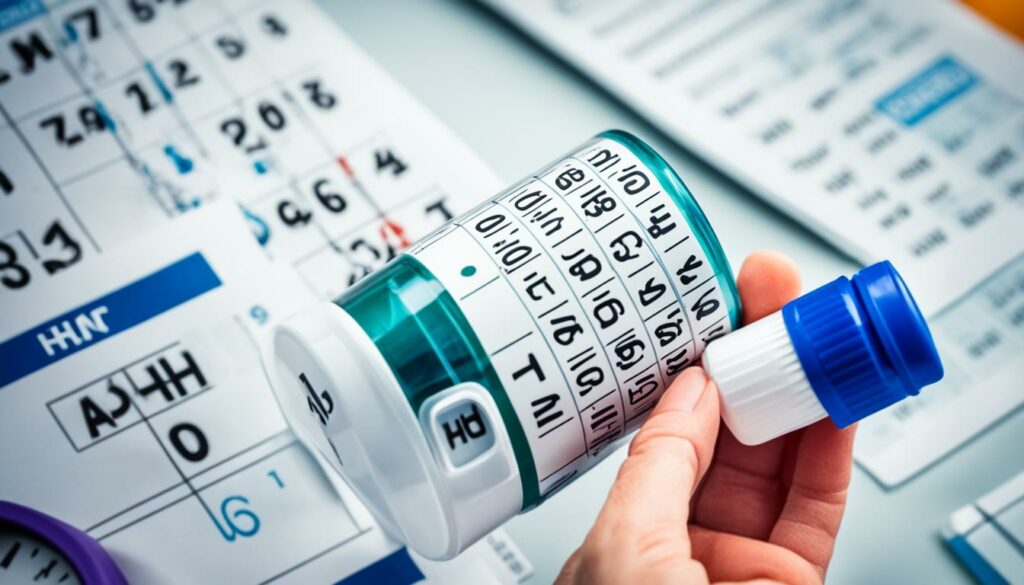Did you know that around 60 to 70 percent of individuals with ADHD experience symptom improvement with medication? However, not everyone responds to ADHD medication in the same way. There are various factors that can affect the effectiveness of medication, leaving some individuals frustrated and in search of answers. If you or a loved one are struggling with ADHD medication, understanding the possible reasons why it may not be working can help guide you towards a solution.
Key Takeaways:
- Not all individuals with ADHD respond to medication in the same way.
- Factors such as individual body chemistry, incorrect dosage, or the wrong class of medication can affect medication effectiveness.
- Working closely with a healthcare professional is crucial in troubleshooting ADHD medication.
- Adjusting medication dosage and exploring alternative medications or combinations may be necessary.
- Considering timing, duration, coexisting conditions, and medication interactions are important for managing ADHD medication.
Understanding Individual Sensitivities and Side Effects
When managing ADHD medication, it is crucial to consider individual sensitivities and potential side effects. Different people may have varying reactions to specific classes of medication, such as amphetamine or methylphenidate. Therefore, a personalized approach is necessary to optimize symptom control and minimize any adverse effects.
Clinicians play a critical role in adjusting ADHD medication dosages to find the right balance for each individual. Careful titration helps determine the optimal level of medication that effectively manages symptoms without causing excessive side effects. During the initial stages of medication adjustment, it is common for patients to have weekly visits with an ADHD clinician to ensure proper monitoring and optimization of the medication plan.
“Careful titration helps determine the optimal level of medication that effectively manages symptoms without causing excessive side effects.”
During the adjustment process, it is essential to closely observe any side effects that may arise. Some common side effects of ADHD medication include loss of appetite, trouble sleeping, mood changes, and increased heart rate. By closely monitoring these side effects, clinicians can make appropriate adjustments to the medication dosage or consider alternative options.
Exploring Alternatives and Combinations
If an individual does not respond well to a specific class of medication, such as amphetamine or methylphenidate, trying an alternative class may be beneficial. For example, younger or newly diagnosed children often do better on methylphenidates, while adolescents and adults tend to do better on amphetamines. However, there are exceptions to these general guidelines, and it may require some trial and error to find the best medication for each individual. In some cases, a combination of medications may also be considered.
Exploring alternatives to ADHD medication can provide options for individuals who may not experience significant improvement with their current medication. Alternative medications, such as atomoxetine (Strattera) or guanfacine (Intuniv), work through different mechanisms and may provide better symptom control for some individuals. However, it is important to note that alternative medications may also have their own side effects and considerations.
Table: Alternative ADHD Medications
| Medication | Class | Dosage Forms | Common Side Effects |
|---|---|---|---|
| Atomoxetine (Strattera) | Norepinephrine reuptake inhibitor | Capsules | Decreased appetite, stomach upset, fatigue |
| Guanfacine (Intuniv) | Alpha-2A adrenergic receptor agonist | Extended-release tablets | Sedation, dry mouth, dizziness |
In addition to exploring alternative ADHD medications, combining medications from different classes may also be an option. For example, combining stimulant and non-stimulant medications can provide enhanced symptom control for some individuals. However, it is important to consult with a healthcare professional to determine the appropriateness and safety of medication combinations.

Considering Timing and Duration of Medication Effects
When it comes to managing ADHD medication, understanding the timing and duration of medication effects is crucial. Each individual may respond differently, and it is important to find the right balance for optimal symptom control.
During the early weeks of starting a stimulant medication, some individuals may experience reduced appetite. This side effect is usually temporary and tends to diminish over time. However, it is essential to monitor any changes in appetite and consult with an ADHD clinician if concerns arise.
On the other hand, some individuals may find that their ADHD symptoms return later in the day as a longer-acting medication wears off. This can significantly impact productivity and daily functioning. Adjusting the medication regimen can address this issue and improve overall treatment effectiveness.
There are several ways to fine-tune the timing and duration of medication effects:
- Trying shorter-acting formulations: Short-acting medications provide symptom relief for a shorter duration but may be helpful for specific situations, such as school or work hours.
- Exploring longer-acting formulations: Longer-acting medications can provide extended symptom control throughout the day, reducing the need for multiple doses.
- Adding a booster dose in the late afternoon: For individuals who experience a significant decline in symptom control later in the day, a booster dose of medication in the late afternoon may be beneficial.

It is important to work closely with an ADHD clinician to determine the best timing and dosage adjustments for individual needs. Consulting with a healthcare professional can provide valuable guidance and ensure optimal management of ADHD medication.
Addressing Coexisting Conditions and Medication Interactions
It is common for individuals with ADHD to have coexisting conditions, such as anxiety or depression. Many individuals may worry that ADHD medication will worsen their anxiety symptoms. However, studies have shown that carefully dosed use of stimulants may actually improve anxiety symptoms in some cases. It is essential to consult with a healthcare professional to address any concerns and find the most suitable treatment options.
During an ADHD medication consultation, healthcare professionals can assess the individual’s condition and determine the best course of action. They may recommend alternative medications or non-drug treatments, depending on the specific needs of the patient. These alternative treatments can include therapy, behavioral interventions, and lifestyle changes that can complement or even replace medication.
“ADHD medication consultation ensures that patients receive personalized care and effective treatment for their symptoms. It is important to work closely with healthcare professionals to manage ADHD medication and address any coexisting conditions,” says Dr. Emily Brown, a renowned ADHD specialist.
Addressing medication interactions is also crucial when managing ADHD treatment. It is essential to inform the healthcare professional about any other medications or supplements being used to avoid potential adverse effects. They will carefully consider any potential interactions between medications and make adjustments accordingly to ensure safe and effective treatment.
Overall, managing ADHD medication involves a comprehensive approach that takes into account individual needs, coexisting conditions, and potential medication interactions. By working closely with a healthcare professional, individuals can find the most suitable treatment options and optimize their symptom management.

Expert Insight:
“ADHD medication consultation is crucial to ensuring that patients receive the most appropriate treatment for their symptoms. Guided by the expertise of healthcare professionals, individuals can explore alternatives, address coexisting conditions, and manage any potential medication interactions,”
Conclusion
Troubleshooting the effectiveness of ADHD medication involves considering various individual factors. These factors include body chemistry, dosage adjustment, medication alternatives, timing and duration of effects, and coexisting conditions. While ADHD medication can be effective for many individuals, finding the right approach may require some trial and error.
It is crucial to work closely with a healthcare professional throughout the treatment process. They can provide guidance and expertise to optimize the effectiveness of ADHD medication and improve symptom control. By closely monitoring and adjusting these factors, individuals can better manage their ADHD symptoms.
Remember that everyone’s journey with ADHD and medication is unique. It may take time to find the most suitable medication and dosage for each individual. The key is to have patience and stay in close communication with your healthcare professional to ensure the best possible outcome.
